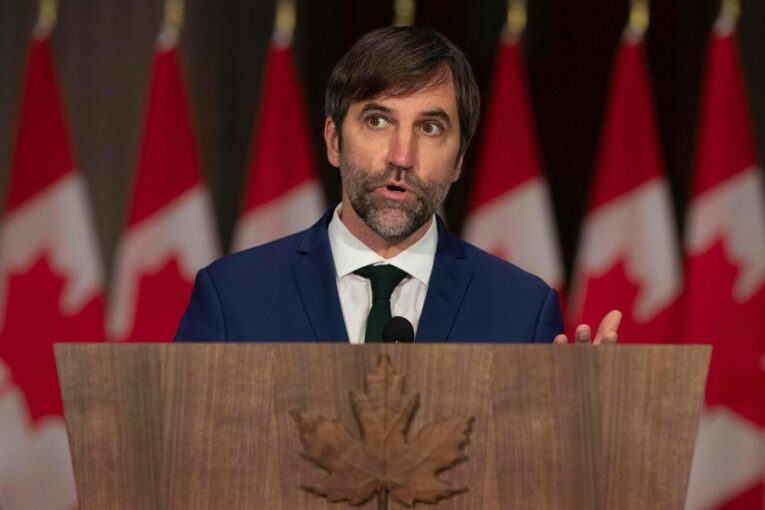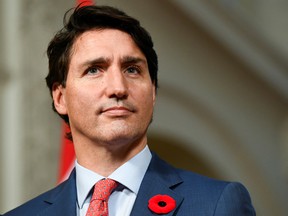
CALGARY — Ottawa surprised the country’s natural resources industry with the appointment of a former Greenpeace activist as Canada’s new environment minister this week, but experts don’t expect additional surprises as the global COP26 climate conference begins in Glasgow this weekend.
Canada’s newly sworn-in Environment and Climate Change Minister Steven Guilbeault said Friday that the country “has one of the world’s most detailed and credible climate plans, including the second most stringent carbon pricing system in the world.”
Guilbeault, who is also a co-founder of Quebec environmental group Équiterre, also took stressed that his role as environment minister means he’s accountable to Canada, not the environmental activists expected to attend COP26 in Glasgow, which begins Oct. 31.
“I’m very aware that those activists will be holding my feet to the fire and I welcome their attention and focus, but I also know that I work for all Canadians and must make this transition work for everyone,” Guilbeault said Friday. “As we look across Canada, it is the energy producing regions that have the most potential to gain by getting the climate fight right and we have to get it right.”
Earlier this week, Guilbeault said “Our plan on climate change is very clear, most of it is already known,” he said, adding that he had “no secret agenda.”
Our plan on climate change is very clear, most of it is already known
Steven Guilbeault
Indeed, experts do not expect Ottawa to unveil a series of new climate targets in Glasgow over the course of the two-week conference. They do, however, expect global policymakers to provide additional details on a push to eliminate coal-fired power from the electricity mix around the world, for a move toward a net-zero power grid and, potentially, for action on a global carbon credit market.
The UN summit, known as COP26 and delayed one year by COVID-19, is intended to finalize the rule book for the Paris accord, including how carbon emissions trading can work between countries and what each country has to report about progress toward climate goals. International officials are also trying to ramp up efforts to curb global warming, with the risk of failure hanging over their heads amid mounting tensions over unmet funding promises.
Guilbeault said he is “cautiously optimistic” about how talks will progress, citing a joint report from Canada and Germany this week that they expect rich countries to step up on a pledge to provide developing nations with US$100 billion in annual aid to tackle global warming — a decade-old commitment that has so far fallen short.
“That being said, it’s not always enough to show up. We can’t always agree,” he said at a virtual news conference Friday.
“These are difficult negotiations. Everyone is not necessarily ready to do more or do more faster,” he added in French.
Everyone is not necessarily ready to do more or do more faster
Steven Guilbeault
Meanwhile, negotiations ahead of the Group of 20 summit in Rome dragged into Friday, stuck on energy and climate issues. Some countries singled out China, saying it is refusing to beef up commitments to limit temperature increases and digging in over coal, with Russia and India also dragging the chain.
Hopes are dim for COP26 in light of the G20 summit’s dithering efforts.
“I would expect little to no new announcements (at COP26),” said Michael Bernstein, executive director at Clean Prosperity in Toronto. “The most important COP is, I would say, for countries to come and raise their ambitions and Canada has already done that part of it, including putting out a detailed plan for how they are going to get there.”
Bernstein said one of the big problems he expects countries at COP26 to tackle is a system for recognizing carbon credits and also for eliminating potential double counting of carbon credits.
“That’s pretty important because you don’t want to get countries double counting their emissions reductions,” Bernstein said, noting that carbon credits used in Quebec are sometimes generated from emissions reductions in California. He said it’s important that those credits are counted only once, rather than once in each jurisdiction.
Earlier this month, Canada set a target of cutting its methane emissions by 30 per cent by 2030 and by cutting its oil and gas methane emissions by 75 per cent over the same time frame.

In April, Prime Minister Justin Trudeau announced the country would cut its CO2 emissions by 45 per cent below 2005 levels by 2030. The country’s previous target was a 36 per cent reduction by that period.
At the COP21 climate conference in Paris in 2015, Canada committed to cutting its CO2 emissions by 30 per cent by 2030.
Experts do not expect additional commitments.
“I feel like this is one area where Canada is heading into COP well positioned,” said Isabelle Turcotte, Ottawa-based director of federal policy at Pembina Institute, adding the country’s methane targets for the oil and gas industry are known, but the waste management and agricultural sectors have yet to see real targets and regulations.
“Are we doing enough in those areas to reduce existing methane emissions?” she said.
Turcotte said she is watching for Canada and other countries to discuss, and potentially commit to, a net-zero emissions grid over the course of the conference, which would likely include a move away from coal-fired power generation.
It’s important that Canada set achievable emissions targets and then stick to them, rather than constantly shifting those targets in an effort to gain green credibility, said Marla Orenstein, director of the natural resources centre at the Canada West Foundation in Calgary.
When Trudeau announced during his re-election campaign in September that he would shift emissions reductions deadlines from 2030 to 2025 for oil and gas producers, Orenstein said the industry lost some faith that real targets were being set.
“I’m not opposed to where we’re all heading, but if it’s not done in a reasonable manner, then it makes everyone just look foolish,” Orenstein said, noting that 2025 targets are likely unachievable and the country’s biggest emitters are continuing to push toward their 2030 targets.
A new analysis by Clean Prosperity released this week suggested the Liberal climate plan could meet Canada’s greenhouse gas emissions targets for the first time before the end of this decade on the back of promises to end the sale of gas-powered cars and create an emissions-free power grid, both by 2035, as well as capping emissions from oil and gas and then forcing them downward, no later than 2025.
With files from The Canadian Press and Bloomberg
• Email: [email protected] | Twitter: geoffreymorgan
You can read more of the news on source
